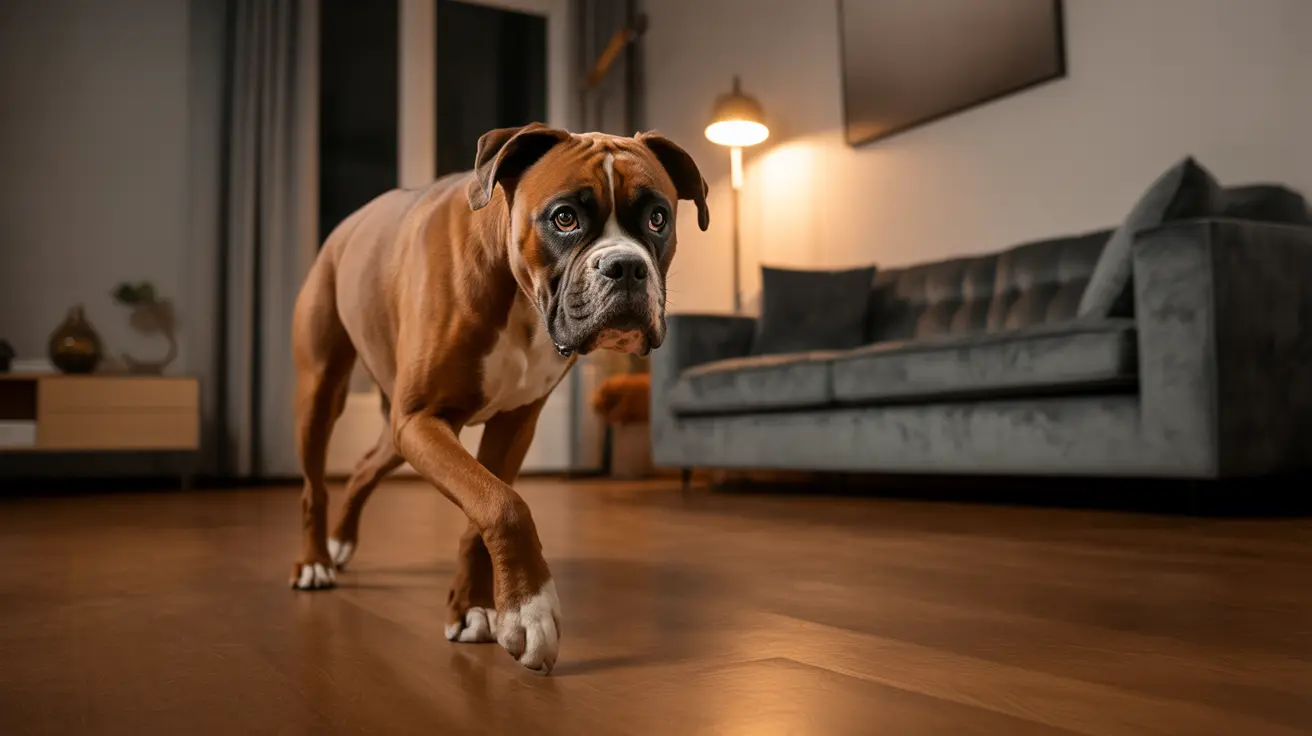Understanding Why Dogs Pace at Night
Nighttime pacing in dogs can stem from multiple sources, including physical discomfort, emotional distress, or age-related changes. Recognizing the specific triggers is the first step toward finding an effective solution for your pet.
Physical Health Causes
Medical conditions often manifest through restless behavior at night. Arthritis pain typically worsens during evening hours, while digestive issues or urinary problems can cause increased movement and discomfort. Additionally, neurological conditions may trigger repetitive pacing behaviors.
Emotional and Environmental Factors
Anxiety plays a significant role in nighttime pacing, particularly separation anxiety when dogs are used to sleeping near their owners. Environmental changes, such as moving to a new home or introducing new pets, can trigger stress-related pacing. Even changes in routine or external stimuli like storms can impact your dog's nighttime behavior.
Signs and Symptoms to Watch For
Beyond simple pacing, dogs may exhibit additional behaviors that can help identify the root cause of their restlessness:
- Whining or vocalization while pacing
- Panting excessively
- Difficulty settling in one spot
- Circling or repetitive movements
- Signs of disorientation
- Changes in sleep patterns
Solutions for Nighttime Pacing
Creating a Calming Environment
Establish a consistent bedtime routine and create a comfortable sleeping area for your dog. Consider using:
- Soft lighting
- White noise machines
- Comfortable bedding
- Temperature regulation
- Anxiety wraps or calming aids
Exercise and Mental Stimulation
Ensuring your dog receives adequate physical exercise and mental enrichment during the day can significantly reduce nighttime restlessness. Include:
- Daily walks or play sessions
- Interactive puzzle toys
- Training exercises
- Socialization opportunities
Medical Intervention When Necessary
If pacing persists despite environmental modifications, consult your veterinarian. They may recommend:
- Pain management medications
- Anti-anxiety treatments
- Cognitive support supplements
- Specific treatments for underlying conditions
Special Considerations for Senior Dogs
Older dogs often experience cognitive decline, which can manifest as nighttime pacing. Canine Cognitive Dysfunction Syndrome (CDS) requires specific management strategies and may benefit from both medical intervention and environmental modifications.
Frequently Asked Questions
Why does my dog pace at night and what common health issues could cause this behavior?
Dogs may pace at night due to various health issues including arthritis, gastrointestinal problems, urinary tract infections, or neurological conditions. Pain, discomfort, or the need to relieve themselves can trigger this behavior. Additionally, cognitive dysfunction in senior dogs often manifests as nighttime pacing.
How can I tell if my dog's nighttime pacing is caused by anxiety or a medical problem?
Anxiety-related pacing often occurs with other signs of stress such as panting, whining, or clinginess. Medical issues typically show additional symptoms like limping, changes in appetite or thirst, or visible discomfort. Keeping a diary of behaviors and circumstances can help identify patterns.
What are effective ways to help reduce my dog's pacing caused by separation anxiety at night?
Establish a consistent bedtime routine, provide a comfortable sleeping area, and gradually condition your dog to sleep independently. Using calming aids like pheromone diffusers, anxiety wraps, or white noise can help. Some dogs benefit from having their bed near yours initially, then gradually moving it to its permanent location.
How does canine cognitive dysfunction syndrome (CDS) affect my senior dog's sleep and pacing at night?
CDS can disrupt normal sleep-wake cycles, causing confusion and restlessness at night. Dogs with CDS may seem disoriented, pace aimlessly, or show signs of anxiety during normal sleeping hours. This condition often requires a combination of medical management and environmental adaptations.
When should I consult a veterinarian for my dog's persistent pacing and restlessness at night?
Consult a veterinarian if pacing is sudden, persistent, or accompanied by other symptoms like pain, changes in appetite or thirst, or signs of illness. Immediate attention is needed if you notice severe distress, difficulty walking, or symptoms of serious conditions like heatstroke or seizures.
Conclusion
While dog pacing at night can be concerning, understanding its causes and implementing appropriate solutions can help restore peaceful nights for both you and your pet. Remember that patience and consistency are key when addressing this behavior, and don't hesitate to seek professional help when needed.






